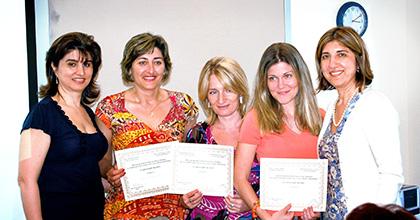By Anna Gustafson
When Marina Khachabayuk moved from Kazakhstan to Forest Hills in 2004, she wanted to continue the nursing career she had begun in her home country but lacked the needed English language skills.
It was difficult for Khachabayuk, 38, to no longer be a part of the nursing world, which she had gravitated toward because of a lifelong love of caring for people. But this changed recently when she began to take a 12-week course from the Metropolitan Council on Jewish Poverty that is trying to better the English skills of nurses from the former Soviet Union in order to prepare them for work in the United States.
“I like it so much,” said Khachabayuk, who moved to Forest Hills to get married. “You get to learn English and have a chance to practice the language. Most of us are working now with Russian-speaking people, so we don’t get to practice our English very often. Plus, you get to learn medical terminology in English, so that’s very good.”
The Met Council just launched Empower N, an initiative that is funded by the Jewish Foundation for Education of Women and which Met officials hope will help the hundreds of nurses from the former Soviet Union who they believe live in the New York City area.
Empower N, Met officials said, is expected to build on the success of the council’s Program for International Nurses, which has helped Russian-speaking nurses train for jobs in the United States.
PIN is run in conjunction with the Phillips Beth Israel School of Nursing and provides a year of high-level English as a Second Language class coupled with a thorough review of nursing practice in the United States in order to prepare Russian-speaking individuals to take the nursing exam that qualifies them to work in this country.
Course instructors realized that many of the nurses’ English skills were too poor to enter the PIN program, which inspired the Met to look into creating Empower N. The new program targets the individuals who need help with their English in an intensive, 12-week training course that focuses on medically contextualized ESL in order to qualify them for the PIN program.
“Met Council is proud to build on the achievements of PIN and to create additional training options for foreign nurses,” said Met’s chief operating officer, Peter Brest.
JFEW board member Jill Smith noted the new program was especially important because of the lack of nurses in the country. According to the American Association of Colleges of Nursing, there are more than 135,000 vacancies in the nursing field.
“The Jewish Foundation for Education of Women has a long tradition of helping immigrant women gain economic self-sufficiency,” Smith said. “We are especially happy to have Met Council as a partner in this venture that helps individual women work in their chosen profession and helps alleviate this country’s nursing shortage.”
Met officials said they believe many of the hundreds of nurses from the former Soviet Union are likely working in jobs that pay less than nursing, such as being a home health attendant.
Khachabayuk, who works as a medical assistant in a private office in Flushing, said she ultimately hopes to work as a nurse in a New York City hospital.
“I like medicine because it is something I can give to the people that’s good,” she said. “I hope to help people.”
Reach reporter Anna Gustafson by e-mail at agustafson@cnglocal.com or by phone at 718-260-4574.

































